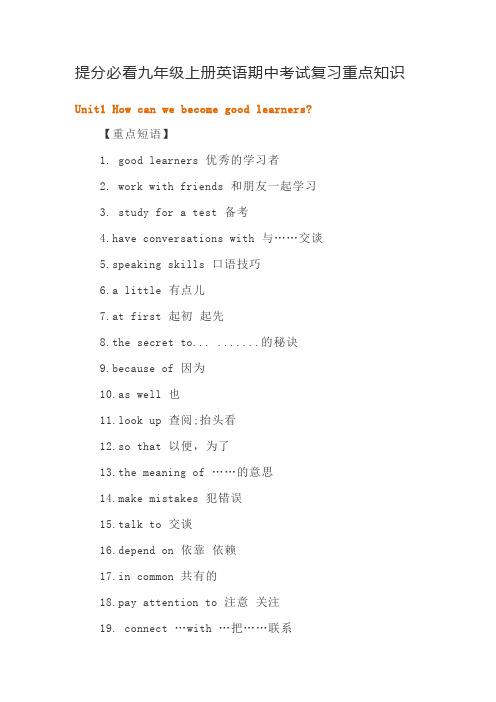九年级英语期中考试知识梳理
- 格式:doc
- 大小:81.50 KB
- 文档页数:11

提分必看九年级上册英语期中考试复习重点知识Unit1 How can we become good learners?【重点短语】1. good learners 优秀的学习者2. work with friends 和朋友一起学习3. study for a test 备考4.have conversations with 与……交谈5.speaking skills 口语技巧6.a little 有点儿7.at first 起初起先8.the secret to... .......的秘诀9.because of 因为10.as well 也11.look up 查阅;抬头看12.so that 以便,为了13.the meaning of ……的意思14.make mistakes 犯错误15.talk to 交谈16.depend on 依靠依赖17.in common 共有的18.pay attention to 注意关注19. connect …with …把……联系20.for example 例如21.think about 考虑22.even if 即使尽管纵容23.look for 寻找24.worry about 担心担忧25.make word cards 制作单词卡片26.ask the teacher for help 向老师求助27.read aloud 大声读28.spoken English 英语口语29.give a report 作报告30.word by word 一字一字地31. so……that 如此……以至于32.fall in love with 爱上33.something interesting 有趣的事情34.take notes 记笔记35.how often 多久一次36.a lot of 许多37.the ability to do sth. 做某事的能力38.learning habits 学习习惯39.be interested in 对……感兴趣40.get bored 感到无聊【重点句型】1.提建议的句子:①What/ how about +doing sth.? 做…怎么样?如:What/ How about going shopping?②Why don't you + do sth.? 你为什么不做…?如:Why don't you go shopping?③Why not + do sth. ? 为什么不做…?如:Why not go shopping?④Let's + do sth. 让我们做…吧。

牛津译林版九年级英语上册期中知识点梳理本页仅作为文档页封面,使用时可以删除This document is for reference only-rar21year.March期中复习考点聚焦 unit1-unit3Unit1词形转换1.energy n.→____energetic_____(adj.)anize v.→_organized_(adj.)→__organization_(n.)组织→ _organizer__(n.)组织者3.suit v. →__suitable_______(adj.)4.patient adj.→ __impatient_______(反义词)5.fix v.→___fixed______(adj.)6.power n.→___powerful______(adj.)7.live v.→___lively __(adj.)活泼的→___alive_(adj.)活着的→___live__(n.)生存,生计8.create v.→__creative_______(adj.)9.practice n.→__practical_______(adj.)实际的10.speech n.→___speeches______(复数)11.appear v.→___appearance______(n.)12.bear v.→____born_____(adj.)天生的13.lead n.→____lead_____(v.)指引,带领→___leader______(n.)领导者重点聚焦❶impatient adj. 不耐烦的,急躁的【点拨】impatient 是由“否定前缀 im-+形容词patient”构成的形容词。
常用短语为be impatient with…,意为“对……不耐烦”。
We shouldn’t be impatient with others.我们不应该对别人不耐烦。

九年级上册英语期中考试单词重点在九年级上册英语期中考试中,有许多重要的单词需要我们掌握。
这些单词涵盖了各个主题和语法知识。
下面是对这些单词的详细介绍。
1. ambitious(有雄心壮志的): 这个形容词用来形容一个人有远大的目标和雄心。
例如:He is an ambitious student who wants to become a doctor in the future.(他是一个有雄心壮志的学生,将来想成为一名医生。
)2. attitude(态度): 这个名词指一个人对待事物的看法或态度。
例如:I don't likehis attitude towards learning.(我不喜欢他对学习的态度。
)3. behavior(行为): 这个名词指一个人的举止或行为方式。
例如:His behavior at the party was unacceptable.(他在派对上的行为是不可接受的。
)4. challenge(挑战): 这个名词指一个困难或难题,也可以指一个人接受或面对困难时的努力。
例如:Climbing Mount Everest is a great challenge.(攀登珠穆朗玛峰是一次巨大的挑战。
)5. complain(抱怨): 这个动词指对某事表示不满或抱怨。
例如:She always complains about her job.(她总是抱怨工作。
)6. confident(自信的): 这个形容词用来形容一个人对自己的能力或成功有信心。
例如:He is confident that he will win the competition.(他对自己能够赢得比赛充满信心。
)7. curious(好奇的): 这个形容词用来形容一个人对某事感到好奇并想要了解更多。
例如:I am curious about the new movie.(我对这部新电影很好奇。

1.九年级英语上册期中知识点动词不定式作宾语补足语1. 后面能接to不定式作宾语补足语的动词有:ask, order, teach, tell, want, wish, help等。
The teacher told us to do Exercise 1. 老师要我们做练习一。
I want both of you to go. 我要你们俩去。
We helped her (to) repair her bike. 我们帮助她修理自行车。
2. 使役动词let, have, make及感官动词see, watch, notice, hear, feel 等要以不带to的不定式作宾补。
Let’s have a rest. 我们休息一会吧。
I saw him come in. 我看见他进来了。
感官动词后既可跟不带to的不定式作宾补,也可跟v-ing作宾补,前者表示动作的全部过程已结束;后者表示动作正在进行。
I saw him come downstairs.我看见他下了楼。
(说明他下楼了这件事)I saw him coming downstairs.我看见他在下楼。
(说明他下楼时的情景)动词不定式作状语Later he left home to work in different cities. 不久他离开家到不同的城市工作。
He went to see a football match. 他去看足球比赛了。
In order to catch the other students, I must work hard.为了赶上其他同学,我必须努力学习。
2.九年级英语上册期中知识点动词不定式作宾语后面能接不定式作宾语的动词有:agree, ask, choose, decide, forget, hope, learn, want, wish, would like等。
1、We hope to get there before dark. 我们希望天黑以前到那儿。

I. Grammar(语法)1. Tenses (时态)- Present simple tense(现在简单时态)- Present continuous tense(现在进行时态)- Past simple tense(过去简单时态)- Past continuous tense(过去进行时态)- Future simple tense(将来简单时态)- Future continuous tense(将来进行时态)2. Modal verbs (情态动词)- Can / could(能够)- May / might(可能)- Shall / should(将要)- Will / would(将要)- Must(必须)- Have to / had to(不得不)- Need(需要)- Dare(敢)3. Conditionals (条件句)- Zero conditional (零条件句)- First conditional (一般条件句)- Second conditional (虚拟条件句)- Third conditional (过去完成虚拟条件句)4. Passive voice (被动语态)5. Reported speech (间接引语)7. Question forms and tags (疑问句和附加疑问句)II. Vocabulary(词汇)1. Synonyms and antonyms (同义词和反义词)2. Collocations (搭配)3. Homophones (同音词)4. Word families (词族)5. Idioms (习语)6. Prepositions (介词)7. Phrasal verbs (短语动词)1. Multiple choice questions (多项选择题)2. True or false questions (判断真假题)3. Matching questions (匹配题)4. Gap filling (填空题)5. Short answer questions (简答题)6. Summary writing (写作摘要)IV. Writing (写作)1. Narrative writing (叙事写作)2. Descriptive writing (描写性写作)3. Argumentative writing (议论性写作)4. Informal / formal letter writing (非正式/正式信件写作)5. Diary / Journal writing (日记写作)V. Listening(听力)1. Listening for main ideas (听取主要观点)2. Listening for specific information (听取特定信息)3. Listening for details (听取细节)5. Multiple choice questions (多项选择题)VI. Speaking(口语)1. Introduce yourself (介绍自己)2. Describing people and objects (描述人和物)3. Expressing opinions (表达意见)4. Giving directions (指示方向)5. Role play (角色扮演)以上是九年级英语期中必考的知识点。

九年级英语期中知识点归纳总结英语对于九年级的学生来说是一门重要的学科,期中考试是对学生所学知识的一次综合检验。
为了帮助同学们更好地复习期中考试的英语知识点,下面将围绕九年级英语课程涉及的主要知识点进行归纳总结。
一、语法知识点1. 时态在九年级英语中,常见的时态有一般现在时、一般过去时、一般将来时、现在进行时、过去进行时、过去将来时等。
需要注意各个时态的构成和用法。
2. 句型九年级英语中,常见的句型有一般陈述句、疑问句、否定句、祈使句等。
需要掌握各种句型的用法和常见的语序。
3. 从句九年级英语中,常见的从句有定语从句、宾语从句和状语从句。
需要理解从句的构成和与主句的关系。
4. 形容词与副词需要掌握形容词和副词的比较级和最高级的构成和用法,以及形容词修饰名词、副词修饰动词的用法。
二、词汇知识点1. 常见单词九年级英语中,需要掌握一定量的单词,包括名词、动词、形容词、副词等。
常见的单词可以通过背诵和阅读积累。
2. 同义词和反义词同义词和反义词在英语中起到丰富词汇和表达意思的作用,需要了解常见的同义词和反义词对,以扩展词汇量。
3. 词组和固定搭配英语中有很多常用的词组和固定搭配,需要掌握这些词组和搭配的用法,以提升表达能力。
三、阅读技巧1. 阅读理解九年级英语中的阅读理解包括短文阅读和长篇阅读,需要掌握提取关键信息、推理判断、理解上下文等阅读技巧。
2. 阅读速度在考试中,合理控制阅读速度是非常重要的。
需要通过平时的阅读练习提升自己的阅读速度和理解能力。
四、写作技巧1. 作文结构英语作文中,常见的结构有五段式结构、三段式结构等。
需要掌握不同结构的写作要点和表达方式。
2. 词汇和句式丰富作文中需要使用一些丰富的词汇和句式,以增加作文的表达力。
需要通过阅读和积累来提升自己的写作水平。
以上就是九年级英语期中考试的一些主要知识点的归纳总结。
同学们在复习期中考试时,可以根据这些知识点有目的地进行复习,提高自己的英语水平。
九年级期中英文知识点Grade 9 Midterm English Knowledge PointsIn grade 9, students are introduced to various key English language knowledge points that serve as the foundation for further language development. This article aims to provide a comprehensive overview of some essential English knowledge points covered in the ninth-grade curriculum.I. Grammar1. Parts of Speecha) Nouns: naming words that represent people, places, things, or ideas.b) Pronouns: words that replace nouns, such as "he," "she," or "it."c) Verbs: action words that describe what someone or something is doing.d) Adjectives: words that modify or describe nouns.e) Adverbs: words that modify or describe verbs, adjectives, or other adverbs.f) Prepositions: words that show relationships between nouns or pronouns and other words in a sentence.g) Conjunctions: words that connect words, phrases, or clauses.h) Interjections: words or phrases used to express strong emotions.2. Sentence Structurea) Subject and predicate: the subject is the noun or pronoun that the sentence is about, and the predicate is the action or description related to the subject.b) Simple, compound, and complex sentences: understanding how to form and use different types of sentences to convey various meanings.3. Tensesa) Present simple: used for general truths, habits, or routines.b) Past simple: used for completed actions in the past.c) Future simple: used for actions that will happen in the future.II. Vocabulary1. Synonyms and Antonymsa) Synonyms: words with similar meanings.b) Antonyms: words with opposite meanings.2. Homophonesa) Words that sound the same but have different meanings and spellings, such as "their," "there," and "they're."3. Prefixes and Suffixesa) Prefixes: added to the beginning of words to change their meaning, such as "un-" or "dis-."b) Suffixes: added to the end of words to change their function or meaning, such as "-able" or "-less."III. Reading Comprehension1. Main Idea and Supporting Detailsa) Identifying the main idea of a text and recognizing the supporting details that provide evidence or examples.2. Inferencesa) Drawing conclusions or making educated guesses based on provided information in the text.IV. Writing Skills1. Essay Structurea) Introduction: presenting the topic and thesis statement.b) Body paragraphs: supporting the thesis statement with evidence and examples.c) Conclusion: summarizing the main points and restating the thesis.2. Narrative Writinga) Writing a fictional or personal narrative, including elements such as characters, plot, and setting.3. Descriptive Writinga) Using vivid language to create a detailed and sensory-rich description of a person, place, or event.4. Persuasive Writinga) Crafting a persuasive argument by presenting evidence and using persuasive techniques to convince the reader of a particular viewpoint.In conclusion, the ninth-grade English curriculum covers a wide range of important knowledge points including grammar, vocabulary, reading comprehension, and writing skills. By mastering these knowledge points, students lay a solid foundation for their further English language development in high school and beyond.。
九年级期中考试英语知识点随着九年级期中考试的临近,同学们都开始紧张地备考。
为了帮助同学们更好地应对英语考试,本文将总结九年级英语的重点知识点,并给予一些备考建议,希望对同学们有所帮助。
1. 时态与语态时态是英语语法中的重点内容之一。
九年级英语的考试会涉及到各个时态的使用。
常见的时态包括一般现在时、一般过去时、一般将来时、现在进行时等。
同学们需要掌握这些时态的基本使用规则,并能够在句子中正确运用。
语态是表示句子主语和谓语动词之间的关系的一种形式。
常见的语态有主动语态和被动语态。
在考试中,同学们不仅要能够分辨句子所使用的语态,还需要理解被动语态的构成和用法。
2. 词汇与短语词汇是语言的基础,也是英语考试的重要内容。
同学们需要掌握九年级基础词汇,包括日常生活中常用的名词、动词、形容词等。
此外,还需要掌握一些常用短语,如“take place”、“get along with”等。
为了帮助同学们更好地记忆和积累词汇,建议同学们在备考过程中练习写作和阅读。
通过写作可以巩固并运用所学词汇,而通过阅读能够积累更多的词汇和短语,并提高理解能力。
3. 语法九年级英语的语法知识点相对较为复杂,需要同学们多加练习和理解。
常见的语法知识点包括名词、代词、形容词、副词、介词、连词等。
同学们需要了解它们的基本用法和特点,并能够在语句中正确运用。
另外,九年级英语的语法知识还包括从句、状语从句、定语从句、宾语从句等。
同学们需要掌握这些从句的构成和用法,并能够正确运用到句子中。
4. 阅读理解在九年级英语考试中,常常会有阅读理解题。
同学们需要在有限的时间内阅读短文,并回答相关问题。
为了提高阅读理解的能力,同学们可以多读英语材料,包括新闻报道、故事等,并注意提高阅读速度和理解能力。
此外,同学们还可以使用一些备考技巧,如先阅读问题,再带着问题去找答案等,以提高解题效率。
5. 口语与写作九年级英语考试中可能会有口语和写作题目。
为了备考口语,同学们可以多和同学们一起练习英语口语,提高口语表达能力。
九年级Unit 1-6 知识点归纳总结Unit1《How can we become good learners》知识点【短语归纳】1. have conversations with sb. 同某人谈话2. too…to… 太……而不能3. the secret to… ……的秘诀4. be afraid of doing sth./ be afraid to do sth. 害怕做某事5. look up 查阅6. repeat out loud 大声跟读7. make mistakes in 在……方面犯错误8. connect ……with… 把……和……连接/联系起来9. get bored 感到厌烦10. be stressed out 焦虑不安的11. pay attention to sth./doing sth. 注意;关注12. depend on 取决于;依靠13. the ability to do sth.. 做某事的能力【单元知识点】1. by + doing :通过……方式(by是介词,后面要跟动名词,也就是动词的ing形式)2. talk about 谈论,议论,讨论The students often talk about movie after class. 学生们常常在课后讨论电影。
talk to sb= talk with sb 与某人说话3. 提建议的句子:①What/ how about +doing sth.做…怎么样(about后面要用动词的ing形式)如:What/ How about going shopping?②Why don't you + do sth.你为什么不做…如:Why don't you go shopping?③Why not + do sth.为什么不做…如:Why not go shopping?④Let's + do sth. 让我们做…吧。
初中英语知识点总结期中一、词汇与短语1. 基础词汇:掌握日常生活中常用的名词、动词、形容词、副词、代词、介词等。
2. 短语动词:了解常见的短语动词,如look after, turn off, give up等。
3. 常见短语:学习并记忆一些固定搭配和短语,例如make a decision, pay attention to, take care of等。
二、语法1. 时态:- 一般现在时:表示经常发生的动作或状态。
- 一般过去时:描述过去发生的动作或状态。
- 现在进行时:表示正在进行的动作。
- 过去进行时:描述过去某一时刻正在进行的动作。
- 一般将来时:表示将来会发生的动作或状态。
- 现在完成时:强调过去发生的动作对现在的影响或结果。
2. 语态:- 被动语态:表示动作的承受者,通常由be+过去分词构成。
3. 非谓语动词:- 动名词:作为名词使用,可以作主语、宾语等。
- 分词:现在分词和过去分词,用作形容词或副词。
- 不定式:to+动词原形,可以作主语、宾语、表语等。
4. 代词:- 人称代词:主格和宾格的使用。
- 物主代词:形容词性物主代词和名词性物主代词。
- 反身代词、指示代词、疑问代词等。
5. 冠词:- 不定冠词a/an的用法。
- 定冠词the的用法。
- 零冠词的特殊情况。
6. 介词:- 表示时间、地点、方向等的介词用法。
- 常见介词短语,如in time, on behalf of, at the age of等。
7. 连词:- 并列连词:and, but, or, so等。
- 从属连词:because, since, although, if等。
三、阅读理解1. 快速阅读:通过扫读抓住文章大意。
2. 精读:理解文章细节,把握作者意图。
3. 推理判断:根据上下文推断生词含义,理解隐含信息。
4. 答题技巧:学会根据问题类型(事实细节题、推理判断题、词义猜测题等)采用相应的解题策略。
四、写作1. 句型结构:使用恰当的句型表达思想,如复合句、并列句等。
Unit 11、how与what的区别:how通常对方式或程度提问,意思有:怎么样如何,通常用来做状语、表语。
what通常对动作的发出者或接受者提问,意思为什么,通常做宾语,主语。
①How is your summer holiday? It’s OK.(how表示程度做表语)②How did you travel around the world? I travel by air.③What do you learn at school? I learn English, math and many other subjects.①What…think of…? How…like…?②What…do with…? How…deal with…?③What…like about…? How…like…?④What’s the weather like today? How’s the weather today?⑤What to do? How to do it?e.g. What do you think of this book?=How do you like this book?I don’t know what I should do with the matter.=I don’t know how I should deal with it.What do you like about China?=How do you like China?I do n’t know what to do next step?=I don’t know how to do it next step?㊣What good / bad weather it is today!(weather为不可数名词,其前不能加 a )㊣ What a fine / bad day it is today! (day为可数名词,其前要加 a )2、提建议的句子:①What/ how about +doing sth.? 如:What/ How about going shopping?②Why don’t you + do sth.? 如:Why don’t you go shopping?③Why not + do sth. ? 如:Why not go shopping?④Let’s + do sth. 如:Let’s go shopping⑤Shall we/ I + do sth.? 如:Shall we/ I go shopping?Unit 21、used to 过去常常做某事,暗指现在已经不存在的动作或状态.后跟动词原形. used to do sth.There used to be ….(反意疑问句)didn’t there?否定形式为: didn’t use to 或usedn’t to疑问形式为: Did…use to…? 或Used…to…?be/get used to doing sth.习惯于, to 为介词.2、反意疑问句:①陈述部分的主语为this, that, 疑问部分主语用it; 陈述部分主语用these, those, 疑问部分用they 做主语.例: This is a new story, isn’t it?Those are y our parents, aren’t they?②陈述部分是there be 结构, 疑问部分仍用there例: There was a man named Paul, wasn’t there?③I am 后的疑问句, 用aren’t I例: I am in Class 2, aren’t I?④陈述部分与含有not, no, never, few, little, hardly, seldom, neither, none 等词时,疑问部分用肯定.例: Few people liked this movie, didn’t they?但陈述句中若带有否定前缀或后缀的单词时, 这个句子仍视为肯定, 后面仍用否定.例: Your sister is unhappy, isn’t she?⑤陈述部分的主语若为不定式或V-ing 短语, 疑问部分主语用it.例: To spend so much money on clothes is unnecessary, isn’t it?⑥陈述句中主语是nobody, no one, everyone, everybody 等指人的不定代词时,疑问部分用they做主语; 若陈述部分主语是something, anything, noting, everything 等指事物的不定代词时, 疑问部分用it 做主语.例: Nobody says one word about the accident, do they?Everything seems perfect, doesn’t it?⑦当主语是第一人称I时, 若谓动为think, believe, guess 等词时, 且其后跟宾丛,这时疑问句部分的人称, 时态要与宾语从句保持一致, 同时还要考虑否定转移.例: I don’t think he can finish the work in time, can he?⑧前面是祈使句, 后用will you? (let’s 开头时, 后用shall we?)3、①be/ become interested in sth. 对…感兴趣②be interested in doing sth. 对做…感兴趣③show great interest in 在……方面产生极大的兴趣④a place of interest 一处名胜some places of interest如:He is interested in math, but he isn’t interested in speaking English.他对数学感兴趣,但是他对说英语不感兴趣。
⑤interested adj. 感兴趣的,指人对某事物感兴趣,往往主语是人⑥interesting adj.有趣的,指某事物/某人具有趣味,主语往往是物⑥an interesting book / man4、spend 动词,表示“花费金钱、时间”①spend…on sth. 在某事上花费(金钱、时间)②spend…doing sth. 花费(金钱、时间)去做某事如:He spends too much time on clothes. 他花费太多的时间在衣着He spend 3 months building the bridge.他花费了三个月去建这座桥。
pay for 花费如:I pay 10 yuan for the book. 我花了10元买这本书。
take动词有“花费”的意思常用的结构有:如:It take(s) sb. …to do sth. 如:It takes me a day to read the book.5、复合句与简单句的转化:①when ------ at the age of …②so…that…----- too…to…. / enough to …③so that…------ in order to do sth.④because…----- because of…⑤if ….----- without / with…⑥if…----- 祈使句+ and / or + 简单句⑦宾语从句----特殊疑问词+动词不定式⑧be afraid 、be sure 、be sorry that +从句---- 动词不定式⑨It seems / seemed that sb….------ sb. seems / seemed to do sth.⑩Sb. hopes / hoped that ….-------sb. hopes / hoped to do sth.Unit 31、主动语态和被动动语态①英语有两种语态:主动语态和被动动语态主动语态表示是动作的执行者被动语态表示主语是动作的承受者Cats eat fish. (主动语态)猫吃鱼。
Fish is eaten (被动语态)鱼被猫吃。
②被动语态的构成由“助动词be +及物动词的过去分词”构成助动词be 有人称、数和时态的变化,其变化规则与be 作为连系动词时完全一样。
时态被动语态结构 例句一般现在 时amare +过去分词 isEnglish is spoken in many countries. 一般过去 时 was +过去分词 were + 过去分词 This bridge was built in 1989. 情 态 动 词 can/shouldmay +be+过去分词 must/……The work must be done right now .③被动语态的用法当我们不知道谁是动作的执行者,或者没有必要指出谁是动作的执行者,或者只需强调动作的承受者时,要用被动语态。
2、only 处于句首,并后跟状语时,全句需要倒装. 例: Only then did he understand it. 只有到那时,他才明白.Only in this way can we learn English well. 只有这样我们才能把英语学好. Only when she came home, did he learn the news. 当她到家时,他才得知了这消息.Unit 41、if 即 虚拟语气通过动词形式的变化来表示说话人对发生的动作或存在的状态所持的态度或看法的动词形式称为语气,虚拟语气表示说话人所说的话不是事实,而是一种祝愿,建议或是与事实相反的假设等。
If 引导的条件状语从句分为真实和非真实条件句,非真实条件句应用虚拟语气。
如果要表示与现在或将来事实相反时,其虚拟语气结构为:(从句)if +主语+动词过去式(be 动词用were), 一般过去时(主句) 主语+would+动词原形如:If I had time, I would go for a walk.如果我有时间,我就会去散步。
(事实上我现在没有时间)If I were you, I would take an umbrella.假如我是你的话,我会带上雨伞。
(事实上我不是你)I would say no if someone asked me to be in a movie.假如有人请我当电影演员,我会表示拒绝。
(事实上瑞没有人请我当电影演员)2、hundred, thousand , million, billion (十亿)词前面有数词或several 一词时要不能加s ,反之,则要加s 并与of 连用,表示数量很多如:several hundred/ thousand/ million/ billion people 几百/千/百万/十亿人hundreds of trees 上百棵树3、would rather …than …(= would …rather than)宁愿,而不愿。